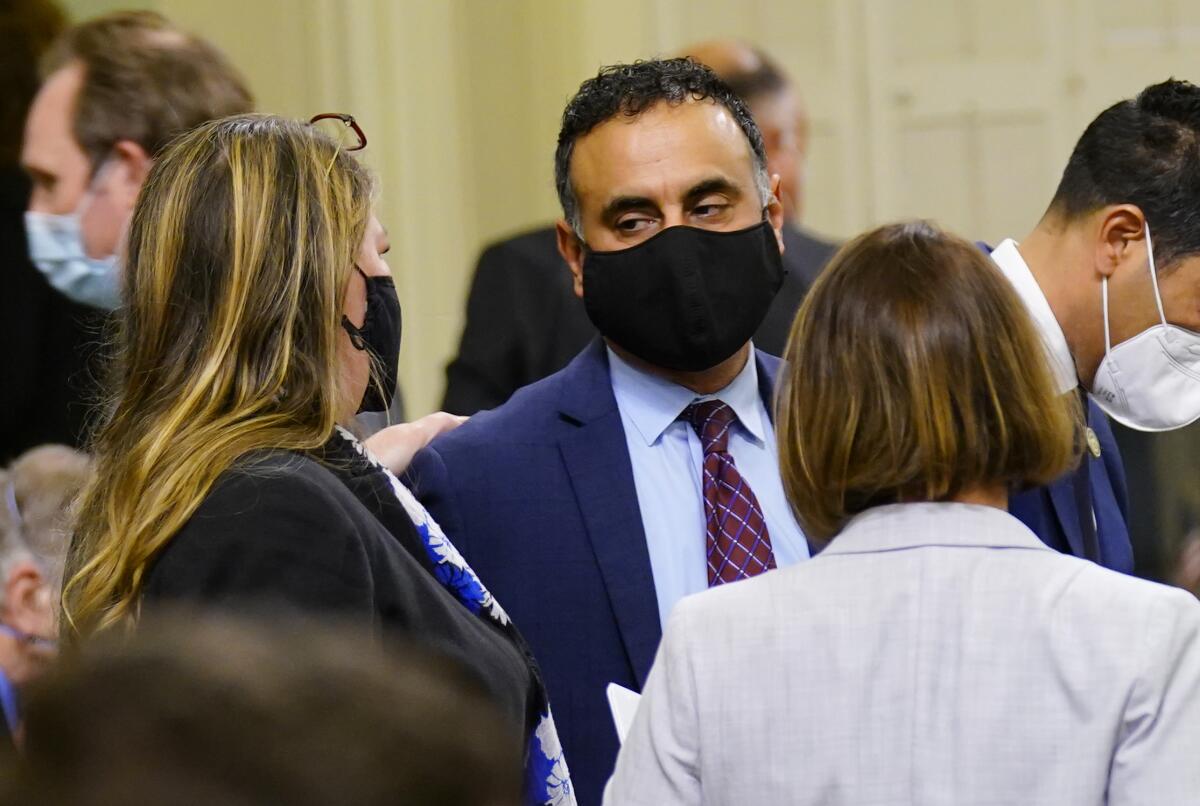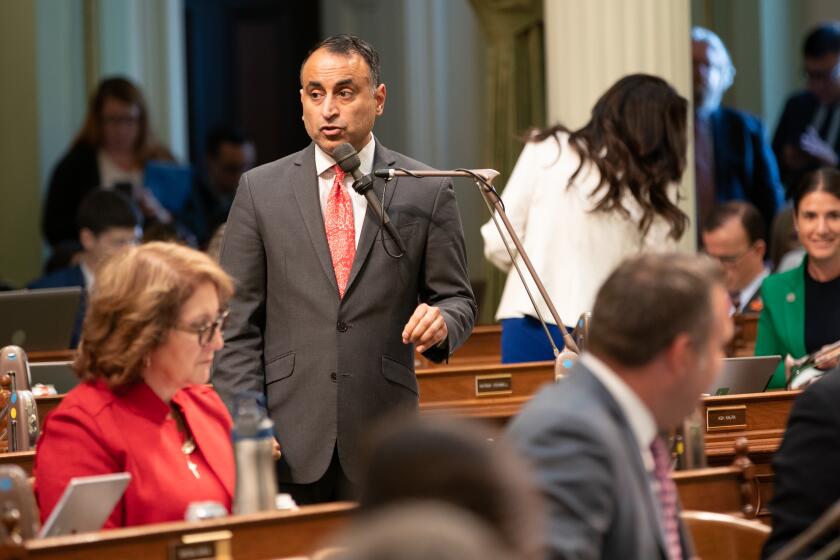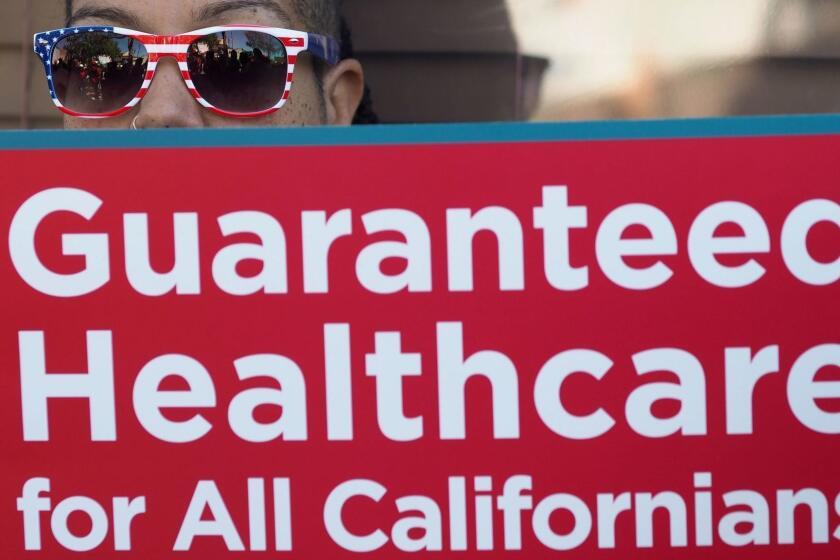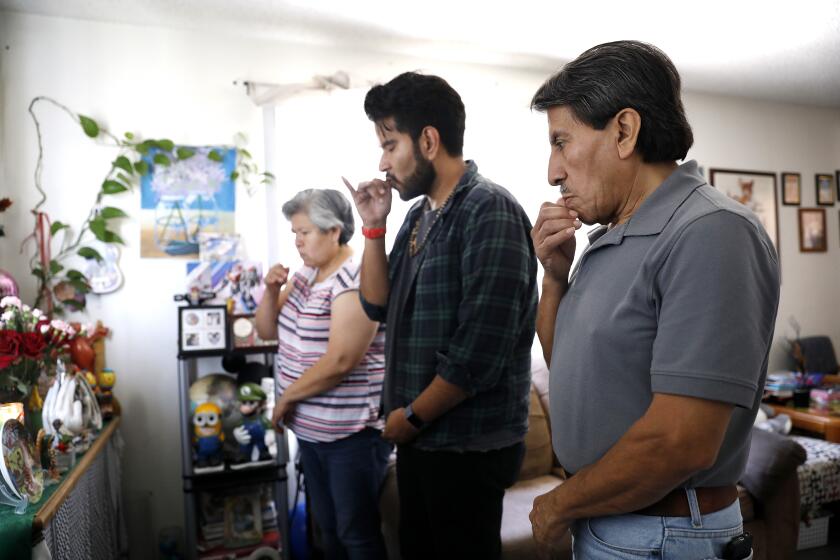California’s single-payer healthcare effort is dead. Why it isn’t going away

- Share via
SACRAMENTO — There’s no bigger litmus test in the California Democratic Party than where a politician stands on single-payer healthcare.
But the anemic performance and unspectacular demise last week of another bill to launch the model in the Golden State shows that may be all it is.
Bogged down by political tension and unanswered questions about its enormous price tag, legislation to guarantee medical coverage to every resident by levying billions in new taxes died in the Assembly without a floor vote.
“AB 1400 was an exercise in abstract morality,” William Hsiao, professor emeritus of economics at the Harvard T.H. Chan School of Public Health, said of the failed legislation. “It’s a dream plan. If you want to put out a plan that has a realistic chance at passage and serious consideration, you have to have serious cost estimates.”
Still, the debate over single-payer in California isn’t going away — even if bills go nowhere at all.
For decades, Democrats at the state Capitol have tried and failed to transition single-payer from a widely shared ideology that every person deserves affordable care to a policy that would replace what many consider a broken healthcare system that puts profits over the well-being of the state’s residents.
Assembly Bill 1400 by Assemblyman Ash Kalra (D-San Jose) did not have the necessary votes to move forward ahead of a key deadline Monday.
Yet each year, lawmakers spend less time publicly vetting the merits of enacting such a complicated and revolutionary system than they do getting mired in the politics surrounding single-payer.
Nurses and unions battle doctors and insurers. Party progressives threaten the political careers of anyone they consider a “corporate Democrat” who could stand in the way. Legislation is tossed around the state Senate and Assembly like a hot potato. The governor distances himself. And at some point, allies turn on one another.
This year wasn’t much different.
Assemblymember Ash Kalra (D-San Jose), the head of the lower house’s progressive caucus, carried Assembly Bill 1400 on behalf of the California Nurses Assn., a union that has become nearly as synonymous with the single-payer movement as U.S. Sen. Bernie Sanders of Vermont.
Kalra said he expected to come up short Monday of the necessary votes to pass the bill off the Assembly floor to the upper house. Others say he may have only had the support of slightly more than half of the 55 Democrats in the Assembly.
Days before the deadline to take up the bill, progressives threatened to withhold coveted California Democratic Party endorsements from any Assembly member who did not vote yes. The move was designed to force lawmakers to support the bill or risk the possibility that the party could give campaign money to more liberal challengers in the June primary.
Kalra faced a tough choice: to call a vote he believed would fail and burn bridges with the Democrats in his house who would become vulnerable to political attacks from the left, or to go against the wishes of his progressive allies, spare his colleagues and sideline the legislation.
He made a “judgment call,” he said, and sacrificed himself rather than hold a vote and watch the bill go “down in flames.”
“If we’re going to lose by a 2-to-1 margin, that’s a sign of weakness for the policy and the movement,” he said. “The easiest thing for me to do for my own personal benefit and my own personal politics was to have the bill heard. I recognized the heat I was going to take in not doing it.”
The backlash came quickly.
National Nurses United tweeted that Kalra “failed to put patients over profits — in the middle of the worst surge of Covid-19 yet.”
Scores of angry single-payer supporters criticized him on social media, posting memes that accused him of being a “political opportunist” and tweets calling him an enemy of the movement who should be voted out of office.
“We were disappointed and I’m still out of words,” said Zenei Triunfo-Cortez, president of the California Nurses Assn., which immediately and publicly condemned Kalra. “If he says there wasn’t enough votes, then let it be on public record and let’s see which lawmakers are for or against it so we know who to work with in the future.”
With several Assembly Democrats choosing not to run for reelection this year and unconcerned about political retribution, it’s unclear whether threats to withhold endorsements advanced the cause.
“Democracy is healthier when voters have more information. And what we were looking for is a vote and transparency, and then engaging in a simple act of democracy in that the Assembly members vote for bills and then the party votes to decide which Assembly members are worthy of endorsement,” said California Democratic Party Progressive Caucus Chair Amar Shergill. “It’s not a particularly revolutionary idea that the California Democratic Party should be informed about how its Assembly members vote before they decide what the endorsement is.”
This year marked the second time in the last five years that a single-payer bill has died in the Assembly, leaving Democratic members under fire from party activists. In 2017, a Senate bill to create a single-payer system was shelved by Assembly Speaker Anthony Rendon (D-Lakewood), who called that proposal “woefully incomplete” without a plan to pay for it.
Rendon’s decision made him the target of intense criticism that year. RoseAnn DeMoro, then the nurses union’s leader, tweeted an illustration of California’s flag with the slogan “Healthy California” and a knife with the name “Rendon” on a blade in the grizzly bear’s back.
“In general, I think people’s bedside manners matter around here,” Rendon said in response to a question of whether that kind of activism helps or hurts causes. “I think members react when pushed, not only when they’re pushed themselves, but also when their colleagues are pushed.”
Rendon said a lot of legislators were turned off by the debate and aftermath of the 2017 legislation.
“I’m kind of curious if maybe they would have had more success or more quickly could have found somebody to pick this up if they had acted differently,” he said.
This time, fingers were pointed in different directions.
Rendon was largely spared criticism from progressives or the nurses union. In a statement released shortly after Kalra’s announcement, he said the shortage of votes for AB 1400 showed how difficult it is to implement single-payer healthcare in the state, though time would bring that goal closer.
“Nevertheless, I’m deeply disappointed that the author did not bring this bill up for a vote today,” Rendon said in the statement. “I support single-payer and fully intended to vote yes on this bill.”
Rendon said single-payer is more than an ideological litmus test in California. He noted that the legislation this year went further than the version five years ago because it was tied to a separate bill, Assembly Constitutional Amendment 11, which spelled out how single-payer could be funded. But he said a more detailed policy doesn’t necessarily make passing single-payer any easier or quell concerns over costs among some lawmakers in his caucus.
“You start having serious conversations and then all of a sudden you do realize how complicated this is,” he said. “It was a much more robust discussion this time. People talked about the cost. People wondered, ‘Does that mean we’re cutting schools? Does that mean we’re cutting other services? What does it mean?’”
Advocates have pointed to studies that generally show Californians will save money under a single-payer system when eliminating the premiums, copays and deductibles they now pay. But unanswered questions about the policy and costly price tag opened a door for opponents to criticize the legislation.
Although much of the blame has centered on Kalra this year, the Assembly member said Gov. Gavin Newsom’s ambivalence didn’t make his job any easier. Kalra said he reached out to the governor’s office last year about the bill, given Newsom’s support for single-payer, but “there wasn’t an interest in engagement.”
Newsom campaigned in 2018 on a promise to deliver single-payer healthcare to California that endeared him to progressives. At the time, his Democratic opponent, former Los Angeles Mayor Antonio Villaraigosa, criticized him for selling “snake oil.”
When Gavin Newsom campaigns on his support for a California single-payer healthcare system, he’s talking about more than the virtues of universal care.
“Newsom was unequivocal, knowing full well it was not possible for a whole host of reasons that are just not theoretical,” said Mike Madrid, a Republican consultant who worked for Villaraigosa’s campaign. “I mean, Donald Trump was the president at the time and you had to have a million federal waivers. To think Donald Trump was going to give you a federal waiver so California could do single-payer is absurd. That was pure political theater.”
Newsom has since focused on a more attainable path to universal healthcare by offering coverage to the largest uninsured population in the state — people living in the country illegally.
Newsom’s plan calls for the state to spend $2.2 billion a year to close the final gap in Medi-Cal eligibility.
Erin Mellon, a spokesperson for Newsom, said advancing healthcare “has been a top priority” for the governor and his work is laying the foundation for single-payer in California.
But when asked about Kalra’s bill last month, Newsom cast single-payer as a more aspirational goal. He said the state must thoughtfully answer the question of how to achieve single-payer — a tacit admission that he never answered the “how” question before he promised to deliver on the campaign trail.
“It’s a values statement,” Madrid said. “It’s not even a real policy discussion. It’s a frame, it’s a lens through which you view what kind of a Democrat you are.”
Newsom also said he had not read Kalra’s bill.
The governor’s allies say his good fortune provides him a rare opportunity to focus on creating a better California, allowing him to spend time on a long-term agenda that could become his legacy.
“I don’t think the governor’s statements helped,” Kalra said. “I think just him distancing himself from single-payer put even more seeds of doubt with my colleagues as to whether this was a viable strategy.”
Some have questioned why Kalra didn’t do more.
Kalra said the speaker’s office was “instrumental in getting the bill on the floor” but admits he did not ask for help corralling votes this year.
“Ultimately, the responsibility is mine and the sponsors’ to get the votes,” he said.
The Assembly health committee overwhelmingly passed the bill, though several Democrats criticized Kalra for ignoring suggested changes. The Assembly Appropriations Committee passed AB 1400 without debate, an unusual move for the fiscal committee on a bill that could cost between $314 billion and $391 billion in state and federal funds, according to a legislative analysis.
Assembly Member Jim Wood (D-Santa Rosa), chair of the Assembly Health Committee, said it was clear that Democratic lawmakers who support single-payer were giving “courtesy votes” so that AB 1400 could move forward.
“The concerns we raised had not been addressed, and my hope was that those would be addressed in the Senate and [the bill would then] return to the Assembly on concurrence,” Wood said.
Hsiao, who sits on a commission Newsom created to craft a report on how to achieve universal health coverage in California, said a lack of concrete funding was “exactly what sank Vermont’s plan.”
Vermont commissioned Hsiao in 2010 to design a single-payer system for the state, which was signed into law by then-Gov. Peter Shumlin, a Democrat. However, the law was ultimately abandoned when an agreement over how to pay for it couldn’t be reached.
Hsiao said under AB 1400, California lawmakers were also considering a plan with “too many unknowns.“
“AB 1400 tried to take a huge quantum leap from where you are to an idealistic plan,” he said. “You have to build a bridge from where you are to cross the rivers and then you need to cross the mountains to get to your destination of a much better healthcare system. California has not dealt with that.”
More to Read
Sign up for Essential California
The most important California stories and recommendations in your inbox every morning.
You may occasionally receive promotional content from the Los Angeles Times.
















